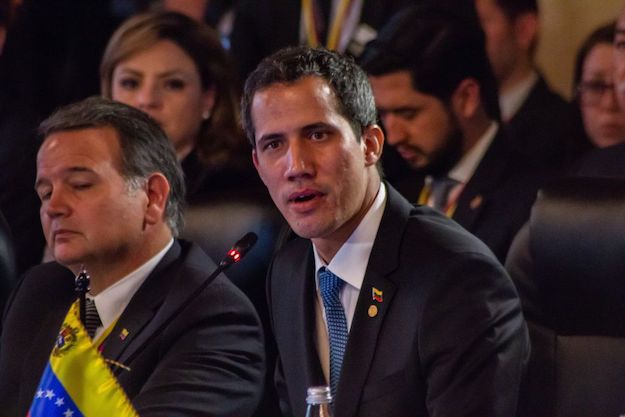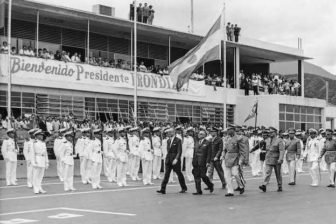An effort this weekend to bring international humanitarian aid into Venezuela marked one of the first attempts by Juan Guaidó and his supporters to exercise power within Venezuela’s borders. The Feb. 23 stand-off and its consequences – including the violent repression of protesters and aid convoys that killed at least six people and injured more than 100 – suggests a new, even more precarious direction for Venezuela’s conflict in the coming weeks.
What happened on Feb. 23?
Guaidó, who was declared interim president of Venezuela by the opposition-controlled National Assembly last month, has already shown strength outside Venezuela by naming a diplomatic corps and moving the international community to increase sanctions on the government of Nicolás Maduro.
But within Venezuela’s borders, he’s been more limited. Public protests and demonstrations against the regime, while vital in keeping pressure on Maduro, can be hard to maintain without signs of clear progress toward the stated objective of a democratic transition. That is partially why the delivery of humanitarian aid was so important – in addition to easing food and medicine shortages, it constituted a concrete step against the regime on its own territory. It is the type of step that could have helped bring about a fracture in the military establishment, whose support is essential to the regime. Maduro was motivated not to allow such a show of power to materialize.
Of all the different options facing Maduro in his response to the delivery of aid, he chose violent confrontation. A boat from Puerto Rico was intercepted by the Venezuelan navy and forced to return under the threat of attack. On the borders with Colombia and Brazil, civilians demanding that aid be let in were met with violence. Two trucks filled with food and medicine were burned shortly after entering Venezuelan territory from Colombia, while repression on the border with Brazil began last week and continued through Monday.
By Sunday morning, Colombian officials reported that more than 150 Venezuelan military members had defected, leading Maduro to withdraw the National Guard from the border and substitute them with police and violent paramilitary units known as colectivos.
The consequences
Maduro made clear on Feb. 23 that he was ready to challenge the international community. His message is that threats of further sanctions or military intervention won’t move him, either because he is willing to confront them or because he doesn’t think the governments making them – most prominently the U.S. – are credible. Maduro is willing to use violence and fear to maintain control, whatever the costs.
This weekend’s events also show that measures like international sanctions have not achieved their objective of fracturing the military establishment; its leadership has stayed cohesive and supportive of the regime, and there is no way for the rank-and-file to spark a rupture. While the stampede of Venezuelan military members to Colombia reflects discontent among soldiers, it also suggests that those who decide to break ranks see leaving the country as their only option.
The opposition, for its part, has succeeded in pushing Maduro to take a step that he had so far avoided: an unmistakable display of his cruel authoritarianism for the world to see. Nevertheless, the opposition’s margin for maneuver inside Venezuela has been considerably reduced.
This was not unexpected. By failing to produce a clear fracture in the military establishment and, on the contrary, finding Maduro clearly willing to resort to violence if it means keeping control, the opposition – unarmed and with minimal institutional capacity – has few options. It could try to maintain public sentiment against the regime, but on its own that will not challenge Maduro’s grip in a meaningful way. The direct consequence of the Feb. 23 crackdown is that the opposition’s strategy will now depend more heavily on Guaidó’s international allies acting on their threats.
Options for the international community
Of the threats made by international actors, military intervention remains only a distant possibility. It would entail complex logistical challenges and require international agreements, even before considering the uncertain consequences that would result.
Even if the U.S. government considered leading such an effort, it is not clear that Venezuela’s neighbors would be willing to lend their territory in support, much less commit military resources. The governments of Chile, Brazil and Colombia all recently ruled out intervention. Furthermore, for President Donald Trump, intervention – and especially any whiff of using the Venezuela situation for domestic political gain – would bring a significant backlash.
The unlikelihood of a military intervention at this stage likely leads the Maduro government to take the threat less seriously, lessening its impact. For the risk of intervention to prompt Maduro to act, concrete steps in that direction would first need to be taken.
But before that happens, there are other pressure points for the international community to test. It could further tighten sanctions to harm Maduro’s circle of power, be it through freezing assets, withdrawing visas or deporting friends and family members. At the same time, the decision to leave Maduro’s side needs to be made as attractive as possible. Steps in that regard offered so far – including an amnesty law promulgated by the National Assembly – have not been persuasive or credible enough to woo important figures across the line.
If and when these steps are exhausted, however, eyes will once again turn toward the idea of military intervention. In coming days, attention will be focused on international actors such as the Lima Group, the European Union and the U.S., Brazil and Colombia.
All the possible outcomes for Venezuela at this point come with a high degree of uncertainty. Any course that the country may now take will be filled with dark corners. What is clear is that, without decisive action from the international community, Venezuelans’ aspirations for democratic change will once again start to fade.
—
Seijas Rodríguez is a Venezuelan political analyst and statistician, Ph.D. He is the director of the Delphos poll.








